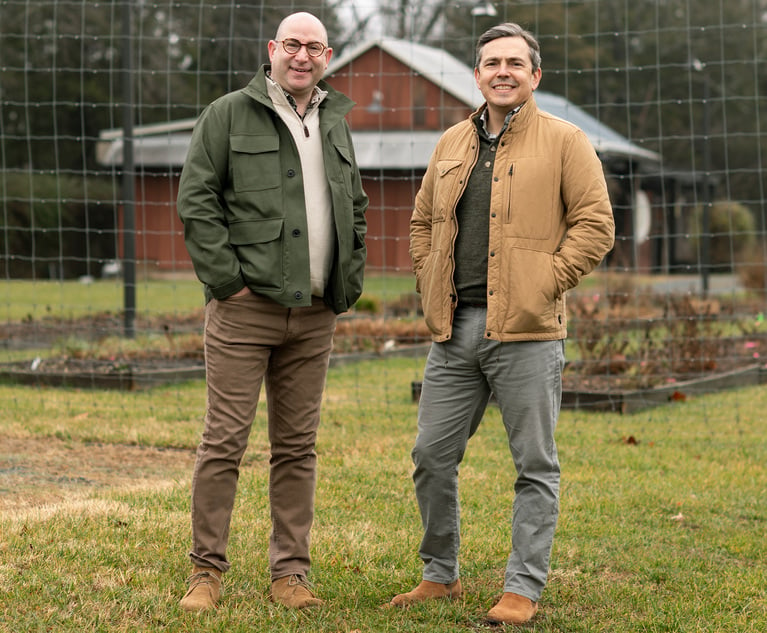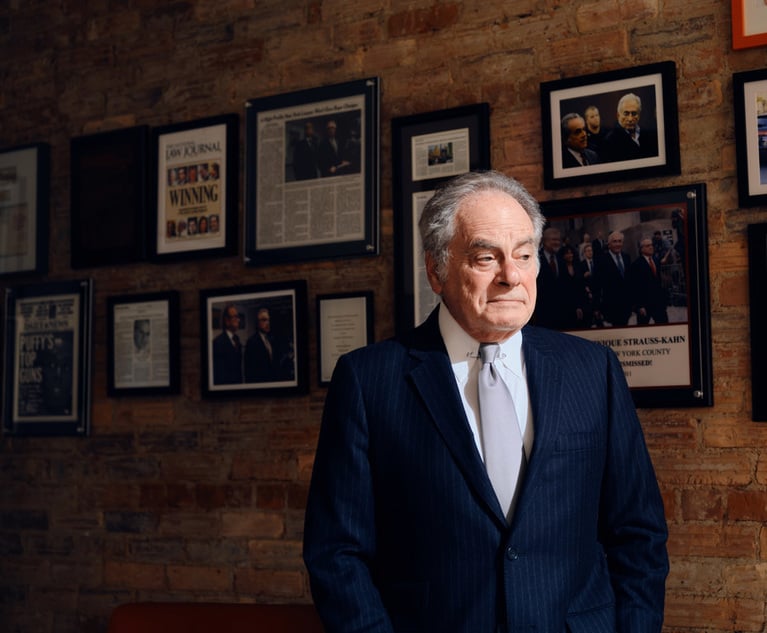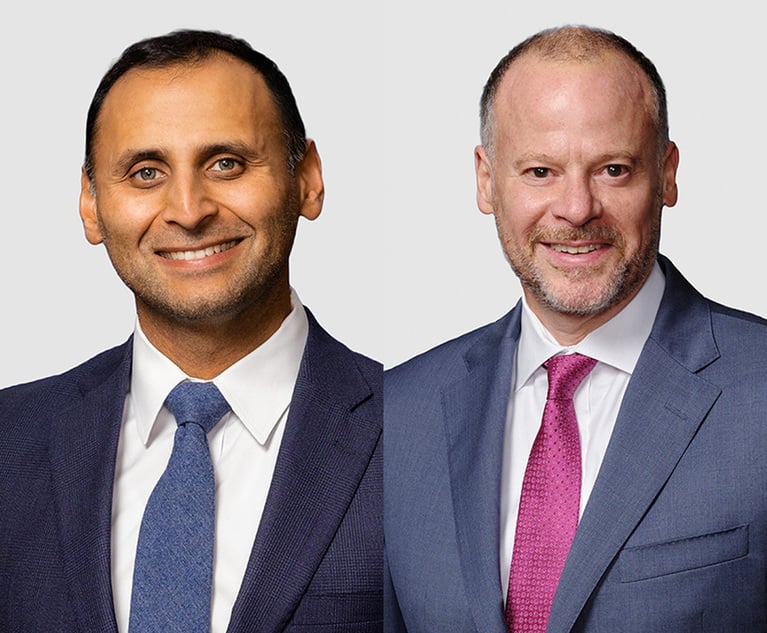Litigators of the Week: An Antitrust Unicorn—With $800M on the Line
“Class actions and antitrust cases never go to trial. Most people don't want to take the risk,” said David Lender, co-chair of Weil's litigation department. “It's the client willing to go to the mat.”
April 27, 2018 at 12:00 PM
5 minute read

In the fall of 2016, David Lender and Eric Hochstadt stepped into the middle of a high-stakes antitrust case that the Weil, Gotshal & Manges partners could only describe as a “unicorn.”
Their client, C&S Wholesale Grocers Inc., was careening toward trial after more than seven years of litigation. At issue: allegations by a class of retail grocers that the New Hampshire-based grocery distributor had secretly conspired with a rival not to compete in the Midwest and New England states.
The case, which exposed the company to nearly $800 million in damages and attorney fees, would become just the fifth antitrust suit to be tried to a verdict in the past five years, according to Weil—but C&S was nonetheless determined to plead its case to a Minnesota federal jury.
“Class actions and antitrust cases never go to trial. Most people don't want to take the risk,” said Lender, co-chair of Weil's litigation department. “It's the client willing to go to the mat.”
Last Friday, the gamble paid off, when the jury cleared C&S of the charges in the U.S. District Court for the District of Minnesota. A case that had lasted more than eight years had taken just one hour for the jurors to decide.
For Lender and Hochstadt, the result was far from inevitable, but it was one they had envisioned since C&S hired them to serve as lead counsel toward the end of expert discovery.
At the time, C&S had endured an appellate court's reversal of a decision to extinguish the lawsuit on summary judgement. Meanwhile, C&S' co-defendant, SuperValu Inc., was in negotiations to settle the case for $8.75 million, leaving C&S on the hook for full damages. Under U.S. antitrust law, winning plaintiffs are entitled to an automatic trebling of damages and the right to recover fees.
However, the Weil team had the advantage of fresh eyes as they took over a case with an admittedly “tortured” past.
“We're gonna look at things slightly differently than the people that had been here before us,” Lender said.
The Weil team mounted a successful challenge to the plaintiffs' expert witness, cutting C&S's potential exposure in half, and won its fight to keep details of SuperValu's settlement negotiations out of the trial record.
But the attorneys also noticed that the plaintiffs' case hinged on their ability to prove the existence of a secret, unwritten agreement between their client and SuperValu to eliminate competition in the two regions and drive up prices for small-town grocers. Lender and Hochstadt set out to exploit every hole they could find in their opponents' case.
The goal: to show that the arrangement was a legitimate effort to consolidate operations and improve efficiency.
The attorneys quickly narrowed the scope of their defense to three separate yet related themes they would hammer at trial: that there was no secret pact, no price inflation in the relevant markets and no injury to the five classes of plaintiffs pressing their claims.
The team marched out a parade of witnesses, including company chairman Rick Cohen, to paint C&S as a third-generation, century-old business that would never jeopardize its reputation by violating U.S. law. Weil also worked with C&S expert witness, longtime University of Virginia economics professor Kenneth Elzinga, to dilute complex theories of economics and competition into simple terms that the jury could understand.
“We needed real people to connect with the jury, who don't have experience in this industry,” Hochstadt said.
The approach contrasted with the decision of plaintiffs' counsel Boies Schiller Flexner to call as witnesses just two out of the five named plaintiffs in the case. During closing arguments, the Weil lawyers presented a board with images of the five lead plaintiffs who had accused C&S of conspiring to harm their businesses. Three were depicted simply with silhouettes.
“They didn't want to tell you why they were injured,” Lender recalled telling the jury.
“We went after them hard… to prove their financial woes had nothing to do with C&S.”
Lender also credited the firm's aggressive strategy of hitting its opponents with quick redirects to expose omissions in their lines of questioning. Those tactics, he said, brought a rhythm to the proceedings, where the jury would expect the strikes.
In the end, he said, the case turned on the issue of credibility.
“Jury trials are all about credibility at the end of the day. I think we were gaining credibility points throughout the trial.”
This content has been archived. It is available through our partners, LexisNexis® and Bloomberg Law.
To view this content, please continue to their sites.
Not a Lexis Subscriber?
Subscribe Now
Not a Bloomberg Law Subscriber?
Subscribe Now
NOT FOR REPRINT
© 2024 ALM Global, LLC, All Rights Reserved. Request academic re-use from www.copyright.com. All other uses, submit a request to [email protected]. For more information visit Asset & Logo Licensing.
You Might Like
View All
Why the Founders of IP Boutique Fisch Sigler Are Stepping Away From the Law and Starting an AI Venture

Like a Life Raft: Ben Brafman Reflects on Nearly 50 Years as a Defense Attorney

Trying a Case for Abu Ghraib Detainees Two Decades After Abuse

Many Americans Don't Trust the Supreme Court This Election; David Boies Isn't One of Them
Trending Stories
Who Got The Work
Michael G. Bongiorno, Andrew Scott Dulberg and Elizabeth E. Driscoll from Wilmer Cutler Pickering Hale and Dorr have stepped in to represent Symbotic Inc., an A.I.-enabled technology platform that focuses on increasing supply chain efficiency, and other defendants in a pending shareholder derivative lawsuit. The case, filed Oct. 2 in Massachusetts District Court by the Brown Law Firm on behalf of Stephen Austen, accuses certain officers and directors of misleading investors in regard to Symbotic's potential for margin growth by failing to disclose that the company was not equipped to timely deploy its systems or manage expenses through project delays. The case, assigned to U.S. District Judge Nathaniel M. Gorton, is 1:24-cv-12522, Austen v. Cohen et al.
Who Got The Work
Edmund Polubinski and Marie Killmond of Davis Polk & Wardwell have entered appearances for data platform software development company MongoDB and other defendants in a pending shareholder derivative lawsuit. The action, filed Oct. 7 in New York Southern District Court by the Brown Law Firm, accuses the company's directors and/or officers of falsely expressing confidence in the company’s restructuring of its sales incentive plan and downplaying the severity of decreases in its upfront commitments. The case is 1:24-cv-07594, Roy v. Ittycheria et al.
Who Got The Work
Amy O. Bruchs and Kurt F. Ellison of Michael Best & Friedrich have entered appearances for Epic Systems Corp. in a pending employment discrimination lawsuit. The suit was filed Sept. 7 in Wisconsin Western District Court by Levine Eisberner LLC and Siri & Glimstad on behalf of a project manager who claims that he was wrongfully terminated after applying for a religious exemption to the defendant's COVID-19 vaccine mandate. The case, assigned to U.S. Magistrate Judge Anita Marie Boor, is 3:24-cv-00630, Secker, Nathan v. Epic Systems Corporation.
Who Got The Work
David X. Sullivan, Thomas J. Finn and Gregory A. Hall from McCarter & English have entered appearances for Sunrun Installation Services in a pending civil rights lawsuit. The complaint was filed Sept. 4 in Connecticut District Court by attorney Robert M. Berke on behalf of former employee George Edward Steins, who was arrested and charged with employing an unregistered home improvement salesperson. The complaint alleges that had Sunrun informed the Connecticut Department of Consumer Protection that the plaintiff's employment had ended in 2017 and that he no longer held Sunrun's home improvement contractor license, he would not have been hit with charges, which were dismissed in May 2024. The case, assigned to U.S. District Judge Jeffrey A. Meyer, is 3:24-cv-01423, Steins v. Sunrun, Inc. et al.
Who Got The Work
Greenberg Traurig shareholder Joshua L. Raskin has entered an appearance for boohoo.com UK Ltd. in a pending patent infringement lawsuit. The suit, filed Sept. 3 in Texas Eastern District Court by Rozier Hardt McDonough on behalf of Alto Dynamics, asserts five patents related to an online shopping platform. The case, assigned to U.S. District Judge Rodney Gilstrap, is 2:24-cv-00719, Alto Dynamics, LLC v. boohoo.com UK Limited.
Featured Firms
Law Offices of Gary Martin Hays & Associates, P.C.
(470) 294-1674
Law Offices of Mark E. Salomone
(857) 444-6468
Smith & Hassler
(713) 739-1250






